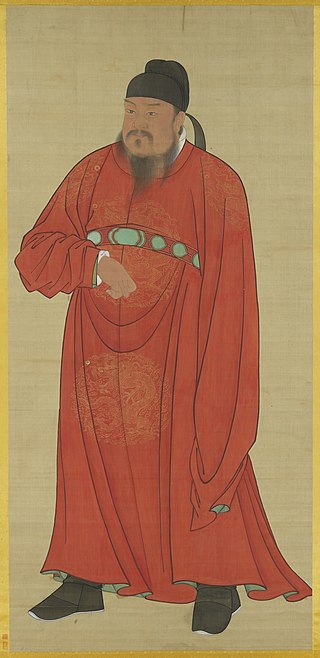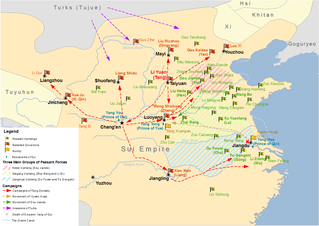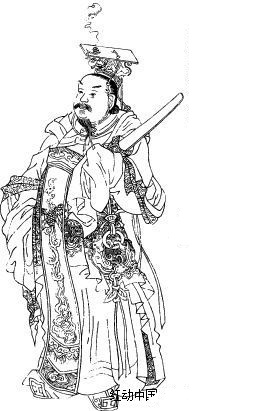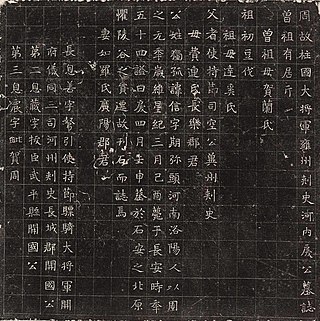
Emperor Gaozu of Tang was the founding emperor of the Tang dynasty of China, reigning from 618 to 626. Under the Sui dynasty, Li Yuan was the governor in the area of modern-day Shanxi, and was based in Taiyuan.

Li Jing, courtesy name Yaoshi, posthumously known as Duke Jingwu of Wei, was a Chinese military general, strategist, and writer who lived in the early Tang dynasty and was most active during the reign of Emperor Taizong. In 630, Li Jing defeated the Göktürks, led by Jieli Khan, with just 3,000 cavalry soldiers in a surprise attack, allowing the Tang Empire to subjugate the Göktürks and reduce them to the status of a vassal under the Tang Empire. Li Jing and Li Shiji are considered the two most prominent early Tang generals.
Feng Lun, courtesy name Deyi, better known as Feng Deyi, formally Duke Miao of Mi, was a Chinese official of the Sui and Tang dynasties who served as a chancellor during the reigns of Emperor Gaozu of Tang and Emperor Taizong of Tang. He was praised for his quick thinking but criticized by historians for his being overly attentive to the emperors' desires.
Empress Xiao, formally Empress Min, was an empress of the Chinese Sui Dynasty. Her husband was Emperor Yang of Sui.
Xue Ju (薛舉), formally Emperor Wu, was the founding emperor of a short-lived state of Qin at the end of the Chinese Sui Dynasty, whose state was eventually destroyed by the Tang Dynasty. He rose against Sui rule in 617 and soon controlled modern eastern Gansu, but while he had some successes against Tang forces, was not able to push toward the Tang capital Chang'an before dying of illness in 618. His son Xue Rengao inherited his throne but was soon defeated and killed by the Tang general Li Shimin, ending the state that Xue Ju established.

Yuwen Huaji was a Chinese military general, monarch, and politician of the Sui Dynasty who, in 618, led a coup against and murdered Emperor Yang of Sui. He subsequently declared Emperor Yang's nephew Yang Hao emperor and led Emperor Yang's elite Xiaoguo Army (驍果) north. However, he was then repeatedly defeated by Li Mi, Li Shentong (李神通), and finally Dou Jiande. Believing that his defeat was near and wanting to become emperor before his ultimate defeat, he poisoned Yang Hao and declared himself the emperor of a Xu state. Dou captured him in 619 and killed him.

The transition from Sui to Tang (613–628) was the period of Chinese history between the end of the Sui dynasty and the start of the Tang dynasty. The Sui dynasty's territories were carved into a handful of short-lived states by its officials, generals, and agrarian rebel leaders. A process of elimination and annexation followed that ultimately culminated in the consolidation of the Tang dynasty by the former Sui general Li Yuan. Near the end of the Sui, Li Yuan installed the puppet child emperor Yang You. Li later executed Yang and proclaimed himself emperor of the new Tang dynasty.

Li Xiaogong (591–640), posthumously known as Prince Yuan of Hejian, often referred to by his earlier title as the Prince of Zhao Commandery, was an imperial prince and general of the Tang dynasty. He was a son of a cousin of Emperor Gaozu, the founder of the Tang dynasty, and served as a general under Emperor Gaozu. He defeated Emperor Gaozu's major competitors Xiao Xi and Fu Gongshi. He was one of the few generals of the early Tang dynasty who had already distinguished themselves in their careers before rising to prominence during the reign of Emperor Gaozu's successor, Emperor Taizong.
Dou Wei, courtesy name Wenwei, formally Duke Jing of Yan'an, was a Sui dynasty official who, after the founding of the Tang dynasty in 618, briefly served as a chancellor until his death later that month.
Yuwen Shiji, courtesy name Renren, formally Duke Zong of Ying, was a Chinese monarch and politician of the Sui and Tang dynasties, serving as a chancellor, as Shizhong (侍中) (625–626) and Zhongshu Ling (中書令) (626–627), during the reigns of Emperors Gaozu and Taizong of Tang. He was previously an imperial prince in the short-lived state of Xu (許), which was ruled by his brother Yuwen Huaji.
Pei Ju (547-627), birth name Pei Shiju, courtesy name Hongda, formally Duke Jing of Anyi, was a Chinese cartographer, diplomat, politician, and writer who lived in the Sui and Tang dynasties, briefly serving as a chancellor during the reign of Emperor Gaozu of Tang. He was praised by traditional Chinese historians for his ability and lack of corruption, but blamed for flattering Emperor Yang of Sui and practically directly contributing to Sui's downfall by encouraging many external military campaigns that drained Sui's resources. Modern historians have questioned these assessments: Arthur F. Wright labelled the latter judgement in the Zizhi tongjian a "particularly blatant piece of editorializing" and "absurd ... beyond doubt".

Gao Jian, courtesy name Shilian, better known as Gao Shilian, formally Duke Wenxian of Shen (申文獻公), was a Chinese politician of the Tang dynasty. He was the uncle of Empress Zhangsun, Emperor Taizong's wife, and a trusted advisor to Emperor Taizong.
Dou Dexuan, formally Baron Gong of Julu (鉅鹿恭男), was an official of the Chinese Tang dynasty, serving as chancellor during the reign of Emperor Gaozong of Tang.

Yao Silian, courtesy name Jianzhi (簡之), formally Baron Kang of Fengcheng (豐成康男), was a Chinese historian and politician during the Sui Dynasty and Tang Dynasty and was the lead author of the Book of Liang and Book of Chen, the official histories of the Liang Dynasty and the Chen Dynasty, which his father Yao Cha (姚察), a Chen official, had begun but did not finish.
Doulu Qinwang, né Lu Qinwang, formally Duke Yuan of Rui (芮元公), was a Chinese official of the Tang dynasty and the Wu Zhou dynasty, serving several terms as chancellor during the reigns of Wu Zetian and her son Emperor Zhongzong.
Linghu Defen (583–666), formally Duke Xian of Pengyang (彭陽憲公), was a Chinese historian and politician. He was an official of the Chinese Sui and Tang dynasties. During the Tang era, he was a major proponent for the compilation of the histories of the Sui and its predecessor the Northern Zhou. He was eventually put in charge of compiling Northern Zhou's official history, Book of Zhou, which was completed in 636.

Dugu Xin, Xianbei name Qimitou (期彌頭), known as Dugu Ruyuan (獨孤如願) before 540, was a prominent general and official during the chaotic Northern and Southern dynasties period of imperial China. In 534, Dugu Xin followed Emperor Xiaowu of Northern Wei to the west to join the warlord Yuwen Tai, and in the ensuing years led Western Wei forces against their nemesis, the Eastern Wei. Despite an early debacle, he captured the former Northern Wei capital Luoyang from Eastern Wei in 537. He rose to high ranks under Yuwen Tai, and his eldest daughter married Yuwen Tai's son Yuwen Yu. When the Northern Zhou dynasty replaced Western Wei, Dugu Xin was created Duke of Wei (衛國公), but was soon forced to commit suicide by the powerful regent Yuwen Hu.
Empress Taimu was posthumously honored the first Empress of the Tang Dynasty. She was known as Duchess Dou or Lady Dou throughout her lifetime, and was the wife of Emperor Gaozu and mother of Emperor Taizong.
Li Bing, was a Chinese politician of the Northern Zhou dynasty, during the Northern and Southern dynasties period. He was the father of Li Yuan, the founding emperor of the Tang dynasty.
Yang Zhong, Xianbei name Puliuru Nunu (普六茹奴奴), formally known as Duke of Sui (隨國公), was a soldier, later general of the Northern Wei dynasty. He is the father of Yang Jian, the founder of the Sui dynasty.